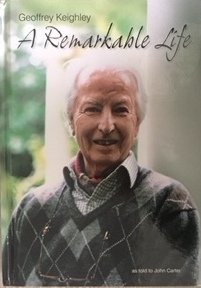Geoffrey Keighley: A Remarkable Life
Martin Chandler |Published: 2006
Pages: 142
Author: Carter, John
Publisher: Private
Rating: 3 stars

I had to do something of a double take when I saw this book advertised a few months ago. It is not entirely clear when it was published, but the surrounding circumstances suggest 2005 or 2006. If it was the latter, and at the back end of that year, it may have just missed the cut off for Post Padwick, otherwise Stephen Gibbs missed it too. In any event the print run must have been very small, as it is not a book I had ever heard of before.
The name Geoffrey Keighley struck a chord on sight. In the days before 1992, when it was an all but absolute requirement in Yorkshire that all who played for the county were born within its borders, Keighley was, Lord Hawke apart, the best known exception that proved the rule. He was an amateur batsman who played a number of times (and indeed captained the county on occasion) between 1947 and 1951.
The stock that Keighley came from was definitely pure Yorkshire, his grandfather establishing successful cotton and carpet businesses in Bradford. Keighley himself, however, was born in France, and brought up in Australia where his father went to extend the interests of the family business in Sydney. Some might argue those circumstances of themselves justify the use of the adjective ‘remarkable’, but if not there was plenty more to come. Keighley was educated at Eton, and then went on to Oxford. He studied law and was called to the bar but, not fancying that as a career went some way to training as an engineer before returning to Australia in 1951. There he turned his talents to agriculture, the arts, aviation and politics, and he enjoyed success in all those varied fields of endeavour.
Keighley died of cancer at the age of 80 in June of 2005. Rightly realising that his old friend’s life story would form the basis of an interesting book, John Carter arranged three lengthy sessions with Keighley and a tape recorder in August and September of 2004. What appears to be a verbatim account of those wide-ranging conversations is what comprises the bulk of the book. The fullness of Keighley’s life is such that a possible reason for the book not coming to Stephen Gibbs’ attention might be that it is not actually a cricket book at all. I can however put that one to bed, it being just past the halfway point before the reminiscing on the subject of Keighley’s cricket career comes to an end.
Does the cricketing interest go beyond the fact of a public schoolboy spending his free time playing the game with a group of seasoned professionals? It certainly does. Keighley scored a century for Oxford University against the touring South Africans in 1947 and, if he only got one for Yorkshire, it was an important one against Surrey in 1951. He seems to have got out in the nineties rather more than would be expected, and the story of his being the first man in the country to figure out the wiles of Sonny Ramadhin in 1950 is an excellent one. It is a shame for England that by the time the tourists encountered Keighley (who proved his point by scoring 92 in the second innings) the Test series had already been lost. A couple of other particularly interesting tales concern interactions with a rather useful Australian batsman who, like Keighley, spent his formative years in Bowral.
Privately published books often suffer from the odd problem and Geoffrey Keighley: A Remarkable Life is no exception. Despite the entirely understandable wish to faithfully transcribe Keighley’s own words a bit more editing could have improved the fluency of the finished product. A careful look from an experienced proof reader would also have avoided some strange names cropping up. Larry Constantine, Denis Hendron and Norris McQuirter jar the most, but aren’t the only examples. It is also frustrating that four pages of the book are taken up with a comprehensive list of Keighley’s 65 First Class appearances, but without even noting his performances let alone the team scores or results, and there is no statistical summary or index.
On the plus side the book is well produced on good quality paper and contains an extensive and varied selection of photographs. The image that adorns the rear board of the book is by some distance my personal favourite – the fact that toddler Keighley is so chest on probably explains why he became an opening batsman, but it remains a priceless image. A few minor grumbles apart Geoffrey Keighley: A Remarkable Life is an interesting read, and well worth seeking out.







Leave a comment